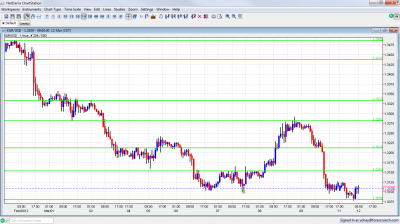Euro dollar kicked off the new week around the same levels it saw late on Friday. After the pair tumbled, ISDA finally called a credit event following the bond swap, and also Moody’s said that Greece is in default. The Eurogroup still needs to provide the green light to the full second bailout, and so does the IMF. Tomorrow’s Fed decision will keep markets tense.
Here’s an update on technicals, fundamentals and what’s going on in the markets.
EUR/USD Technicals
- Asian session: A quiet session for a Monday saw the pair dip to around 1.3080 before rising above 1.31 once again.
- Current range: 1.3080 to 1.3150.
- Further levels in both directions: Below: 1.3080, 1.2945, 1.2873, 1.2760, 1.2660 and 1.2620.
- Above: 1.3150, 1.3212, 1.3280, 1.333, 1.3430, 1.3486, 1.3550 and 1.3615.
- 1.3080 is immediate and strong support. Note that 1.30 is a psychologically important number, but doesn’t offer much support.
- 1.3280 proved to be strong on the upside once again.
Update: The pair moved higher, but fell short of the 1.3150 line.
Euro/Dollar steady in low ground – click on the graph to enlarge.
EUR/USD Fundamentals
- 7:00 German WPI. Exp. +1.1%. Actual 1%.
- 18:00 US Federal Budget Balance. Exp. -229.2 billion.
- 19:00 Eurogroup Press conference. Will the green light finally be given for the full bailout?
For more events later in the week, see the Euro to dollar forecast
EUR/USD Sentiment – Details of hurdles
- Still awaiting final approval: Even though Greece completed the PSI rather successfully, the EU still needs to provide a final green light. It depends on an assessment about Greece’s “prior actions”. German finance minister Schäuble said that the Eurogroup will decide what to do next. The decision could be postponed to next week.. Here are 5 hurdles that could further delay or cancel the bailout.
- Officially in default: Moody’s joined other rating agencies and put Greece in default. After long hours, ISDA finally acknowledged that the use of CACs means a credit event, and that Credit Default Swap contracts will be paid. This had a very small effect on markets so far.
- Great Non-Farm Payrolls: Not only did the jobs report exceed expectations with +227K, revisions to prior releases also added 61K jobs. Looking deeper showed a rise in the participation rate, a drop in the “real unemployment rate”, and also an improvement which Bernanke follows more closely. Chances of an announcement of QE3 tomorrow are very slim.
- Worries from China: The economic giant joined its neighbor Japan and posted a huge trade deficit. This weighs on the “risk environment” and helps the US dollar.
- PSI – Good participation but CACs needed: The level of participation in the Greek Private Sector Involvement, or haircut, was relatively high. Nevertheless, it wasn’t high enough for reaching the goal of 95% for the second bailout. In order to reach this goal, Greece imposes “Collective Action Clauses” – which actually force the holdouts to receive the same haircuts like the others. Using CACs is involuntary, and if ISDA uses common sense, it will call a credit event, triggering Credit Default Swaps. Note that there are specific bonds that include a loophole – one that could still cause a delay
- Portugal will struggle to return to the markets: While Portugal is probably successful at implementing the program, it will find it hard to return to the markets, after Greece has defaulted and after the private sector got a haircut, while the official sector didn’t.
- German ministers wants Greece to go: In a passive aggressive move, German finance minister Wolfgang Schäuble said that he will respect countries who want to leave. Greece doesn’t want to leave, but there’s a growing notion that it is pushed to declare bankruptcy. This joins the words of Hans-Peter Friedrich that said he would advise Greece to leave the euro-zone and said that Greece should be “made an offer it can’t refuse” to leave.
- Draghi warns about inflation: The ECB left rates unchanged and made no policy changes. In the press conference, Draghi was very satisfied with the LTROs. He also warned about inflation, and said that the ECB has tools to fight it.
- Plan B still possible: Despite the deal, things, such as the IMF contribution (to be decided on Thursday, March 15th) or more Greek misses, could still go wrong. There are reports about plans made in Germany and the US for a Greek bankruptcy on March 23rd, when Athens will raise a white flag and a bank holiday will be announced. Here are 5 more ominous signs that Greece is pushed to the corner.

